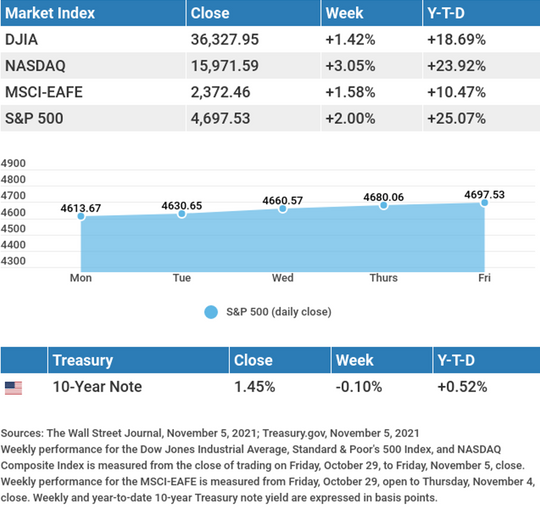
Stocks were mixed last week in choppy trading as investors battled the crosscurrents of good economic data and a troubling rise in COVID-19 infections globally.
The Dow Jones Industrial Average slid 1.38%, while the Standard & Poor’s 500 added 0.32%. The Nasdaq Composite index gained 1.24% for the week. The MSCI EAFE index, which tracks developed overseas stock markets, dropped 0.59%.1,2,3


Trading Uncertainty
A healthy retail sales report, falling jobless claims, positive earnings surprises, and strong manufacturing data lent support to stock prices, but investor sentiment was dampened by several concerns.
Chief among these worries are a resurgence of COVID-19 infections this winter and the impact inflation may have on consumer confidence and corporate profit margins. The uncertainty surrounding the renomination of Fed Chair Powell exacerbated this unease; a decision from President Biden may come soon. Technology and other high-growth companies led the market, while some of the reopening stocks, such as travel and energy, lagged.
Retail Sales Jump
October retail sales increased 1.7%, indicating that consumers may be more confident than recent surveys have suggested. Sales of electronics, appliances, and autos were particularly strong last month.4
The market cheered the report, interpreting the results as a sign that inflation has not discouraged Americans from buying the products and services they want or need. This retail sales number, however, may be overstated for two reasons. First, higher prices increase the level of sales even if consumer demand is flat. Second, spending may have been pulled forward by consumer worries over higher future prices and concerns that goods may not be available during the holiday shopping season.
Final Thought
We want to take this opportunity to wish you and your family a wonderful Thanksgiving, full of family, fun, and joy.
On this special day of gratitude, we would also like to express our appreciation to you for extending us the privilege of serving you this year and helping you pursue your important financial goals.
Robert Roman
CEO, Managing Director
Louis Barajas
Partner
THIS WEEK: KEY ECONOMIC DATA
Monday: Existing Home Sales.
Tuesday: Composite PMI (Purchasing Managers’ Index) Flash.
Wednesday: Jobless Claims. Durable Goods Orders. Gross Domestic Product (GDP). New Home Sales. Consumer Sentiment. Federal Open Market Committee (FOMC) Minutes.
Source: Econoday, November 19, 2021
The Econoday economic calendar lists upcoming U.S. economic data releases (including key economic indicators), Federal Reserve policy meetings, and speaking engagements of Federal Reserve officials. The content is developed from sources believed to be providing accurate information. The forecasts or forward-looking statements are based on assumptions and may not materialize. The forecasts also are subject to revision.
THIS WEEK: COMPANIES REPORTING EARNINGS
Monday: Zoom Video Communications, Inc. (ZM).
Tuesday: Best Buy Co., Inc. (BBY), Dollar Tree, Inc. (DLTR), Dell Technologies, Inc. (DELL), Autodesk, Inc. (ADSK), Analog Devices, Inc. (ADI).
Wednesday: Deere & Company (DE).
Source: Zacks, November 19, 2021
Companies mentioned are for informational purposes only. It should not be considered a solicitation for the purchase or sale of the securities. Investing involves risks, and investment decisions should be based on your own goals, time horizon, and tolerance for risk. The return and principal value of investments will fluctuate as market conditions change. When sold, investments may be worth more or less than their original cost. Companies may reschedule when they report earnings without notice.

“The emblem of a philosophy is not that it contains a set of specific thoughts, but that it generates a way of thinking.”
– Samuel R. Delany

Selling Your Car or Buying From a Private Seller? Here Are the Tax Tips You Should Know
The first is that if you’re selling your car for less than what you paid for it, you likely won’t need to pay any sales tax on the sale because the IRS considers selling a used car for less than what you paid a capital loss. However, if you’re selling your car for more than what you paid (like if it’s a classic car you’ve restored and it’s increased in value), you may need to pay sales tax.
If you’re buying a car from a private seller, you may need to pay sales tax, but this sales tax doesn’t go to the seller – it goes to the Department of Motor Vehicles and is incorporated into your car’s registration.
* This information is not intended to be a substitute for specific individualized tax advice. We suggest that you discuss your specific tax issues with a qualified tax professional.
Tip adapted from CarGurus5

Stretches to Complement Your Workout
Here are some great stretches that will open up your hips, stretch out your hamstrings, and give your quads some love after a long run or lifting session:
- Hamstring Stretch – Lay on the ground with your legs straight up. Gently pull one leg toward you until you feel pressure. Repeat with the other leg.
- Figure Four – Sit on the ground with your legs bent and knees up. Gently rest one ankle on the quad of the opposite leg. If this is too much, straighten one leg on the floor and rest your ankle on your thigh while it’s on the ground.
- Child’s Pose – Child’s pose is a common yoga movement, but it also can be a great stretch. Either hold the regular child’s pose with your knees about hip width apart or intensify the stretch by bringing your knees out wider.
Tip adapted from Runner’s World6

The Cage family has a mother, father, and six sons, and each son has one sister. So, how many people are in this family?
Last week’s riddle: An interesting occurrence happened about 25 minutes before 1 p.m. on May 6, 1978, involving numbers on the clock and months and years on the calendar. What was this numerically interesting moment? Answer: Early that afternoon, the time and date read 12:34 on 5/6/78.

Puppy (Canis lupus familiaris) and kitten (Felis catus) asleep on a very comfortable-looking blanket.
Footnotes and Sources
1. The Wall Street Journal, November 19, 2021
2. The Wall Street Journal, November 19, 2021
3. The Wall Street Journal, November 19, 2021
4. CNBC, November 16, 2021
5. cargurus.com, June 24, 2021
6. Runner’s World, June 24, 2021
Investing involves risks, and investment decisions should be based on your own goals, time horizon, and tolerance for risk. The return and principal value of investments will fluctuate as market conditions change. When sold, investments may be worth more or less than their original cost.
The forecasts or forward-looking statements are based on assumptions, may not materialize, and are subject to revision without notice.
The market indexes discussed are unmanaged, and generally, considered representative of their respective markets. Index performance is not indicative of the past performance of a particular investment. Indexes do not incur management fees, costs, and expenses. Individuals cannot directly invest in unmanaged indexes. Past performance does not guarantee future results.
The Dow Jones Industrial Average is an unmanaged index that is generally considered representative of large-capitalization companies on the U.S. stock market. Nasdaq Composite is an index of the common stocks and similar securities listed on the NASDAQ stock market and is considered a broad indicator of the performance of technology and growth companies. The MSCI EAFE Index was created by Morgan Stanley Capital International (MSCI) and serves as a benchmark of the performance of major international equity markets, as represented by 21 major MSCI indexes from Europe, Australia, and Southeast Asia. The S&P 500 Composite Index is an unmanaged group of securities that are considered to be representative of the stock market in general.
U.S. Treasury Notes are guaranteed by the federal government as to the timely payment of principal and interest. However, if you sell a Treasury Note prior to maturity, it may be worth more or less than the original price paid. Fixed income investments are subject to various risks including changes in interest rates, credit quality, inflation risk, market valuations, prepayments, corporate events, tax ramifications and other factors.
International investments carry additional risks, which include differences in financial reporting standards, currency exchange rates, political risks unique to a specific country, foreign taxes and regulations, and the potential for illiquid markets. These factors may result in greater share price volatility.
Please consult your financial professional for additional information.
This content is developed from sources believed to be providing accurate information. The information in this material is not intended as tax or legal advice. Please consult legal or tax professionals for specific information regarding your individual situation. This material was developed and produced by FMG Suite to provide information on a topic that may be of interest. FMG is not affiliated with the named representative, financial professional, Registered Investment Advisor, Broker-Dealer, nor state- or SEC-registered investment advisory firm. The opinions expressed and material provided are for general information, and they should not be considered a solicitation for the purchase or sale of any security.
Copyright 2021 FMG Suite.


